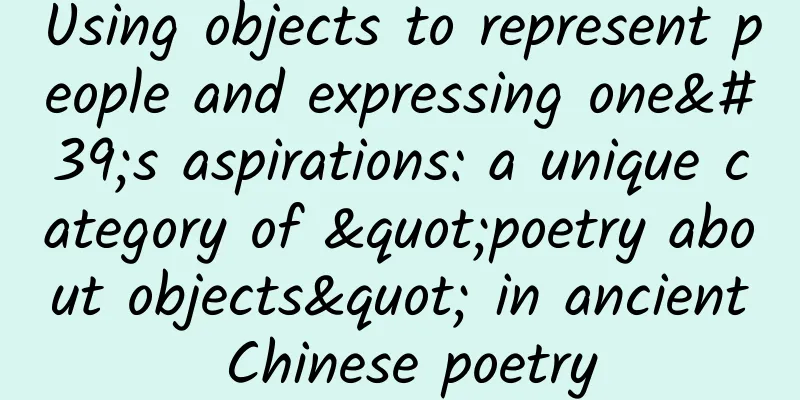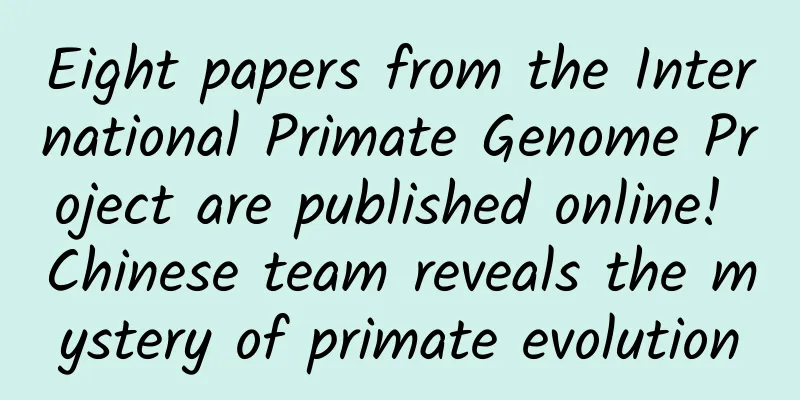Using objects to represent people and expressing one's aspirations: a unique category of "poetry about objects" in ancient Chinese poetry

|
China is a country of poetry. Among the numerous ancient poems that have survived, an important category is "poems about objects". Since ancient literati and intellectuals often like to express their aspirations through objects, sing about specific things to describe themselves, and express their personal emotions, they reveal their attitude towards life and humanistic thoughts, so poems about objects are rich and wonderful. Poetry about things is a kind of poetry that expresses one's aspirations through objects . Ancient Chinese poets were particularly fond of poetry about things, often expressing themselves, expressing personal emotions, displaying humanistic thoughts, revealing personal attitudes towards life, expressing their good wishes, expressing profound life philosophies, or showing the colorful interest of life through poetry about specific things. Among ancient poetry works, poems about objects account for a very high proportion. For example, in the Tang Dynasty, the peak of poetry creation , among the approximately 50,000 Tang poems that have survived , nearly 6,300 poems about objects account for 12 % . In particular, Tang poetry is particularly good at "image thinking" in art, often using natural images of the sun, moon, stars, mountains, rivers and scenery to express emotions, so the poems about objects are naturally vivid and lively! From the late Tang Dynasty to modern times, Chinese intellectuals have become more and more fond of expressing their thoughts through objects, especially the scenery in nature. Therefore, writing poems about objects has become a trend among literati. There are countless works on related themes, and there are excellent works in every period. Of course, in terms of overall artistic level, Tang poetry is still the highest! Here is an introduction. 1. Poetry and lyrics that sing the praises of natural phenomena such as “rain, snow, wind, and clouds”. Mountains, rivers, rain, snow, wind and clouds in nature are important subjects for ancient poets to describe and sing. However, the praise of mountains, rivers and mountains can be classified into another category, "landscape and pastoral poetry", which needs to be discussed separately. Here we will only talk about rain, snow, wind and clouds . Let's talk about famous poems about "rain" first. The first of the masterpieces is "Happy Rain on a Spring Night" by Du Fu, the great poet of the Tang Dynasty: Good rain knows its season, and it happens in spring. It sneaks into the night with the wind, moistening everything silently. The wild paths and the clouds are all dark; only the fire on the river boat is bright. In the morning, I see the red wet area and the heavy flowers in the Jinguan City. The poet enthusiastically eulogizes the timely spring rain that nourishes all things, and hopes that the flowers and trees in Jinguan City (Chengdu) will be "red and wet" in the early morning. It is through the "good rain" that he expresses his beautiful expectations, which can be regarded as a masterpiece of all ages. The only one who can compare with Du Fu is probably the "Written in a Drunk Style at Wanghu Tower on June 27th" by Su Shi, a great writer in the Song Dynasty: The black clouds are like ink but have not covered the mountains, and the white raindrops are like pearls jumping into the boat. The wind suddenly came and blew away the clouds, and the water under the Wanghu Tower was like the sky. The poet endowed the wind and rain with colors and movements, and wrote about the storm very vividly. He also described the beautiful rain scene in Wanghu Tower beside West Lake, allowing readers to feel the leisurely and peaceful atmosphere of the natural world and the endless business, and also showing the author's casualness of "lying on the water and facing the wind". Another excellent work is "Presented to Mr. Zhang, Eighteenth Official of the Water Department, in Early Spring", which describes the beautiful scenery of light rain in early spring: The rain in the sky is as soft as butter, and the grass looks green at a distance but is not there when you get close. The best time of the year is spring, which is far better than the willows and smoke all over the imperial capital. Famous poems about "snow". First, let's talk about "Remembering Mr. Hu's Home on a Winter Evening Snow" by Wang Wei, a Tang Dynasty poet. Its artistic conception and charm can be compared with Du Fu's "Happy Rain on a Spring Night"! The ancients praised it as a superior work among snow poems : The cold night heralds the dawn, and the clear mirror reflects the aging face. The wind through the window startles the bamboos, and when the door is opened, the mountains are covered with snow. The empty alley is quiet, the spacious courtyard is idle. I asked about Yuan An's residence, and he was still in seclusion. The poet describes what he saw and felt when it snowed in the early morning of winter. His writing is ethereal and his charm is far-reaching. The snow evokes his thoughts for his friend. At the end, he mentions the poor residence of his friend, which is true and heartfelt. In addition, there is another work that expresses the poet's sentimental feelings of hard-won opportunities through the poem "Song of Snow" by Wu Jun, a Southern Dynasty writer and historian during the Northern and Southern Dynasties: The breeze shakes the trees in the courtyard, and fine snow falls through the gaps in the curtains. The sky is swirling like fog, and the steps are covered with flowers. No willows in spring, only white cassia twigs. No one can express their gratitude for shedding tears, and what is the use of missing someone in vain? The poet wrote neither about the snow in the wilderness nor about the auspicious snow flying all over the sky, but about the fine snow in the courtyard of Jiangnan , which was meant to express the lonely mood in the snow. Luo Yin, a poet in the late Tang Dynasty who was good at writing poems about objects, wrote a poem called "Snow" with a completely different and unique intention. He used the snow to express his deep sympathy for the poor people: Everyone talks about a good harvest, but what happens in a good harvest? There are poor people in Chang'an, so it is not appropriate to have too many of them as a good omen. Famous poems about "wind". The best poem about wind in history is "Ode to the Wind" by Wang Bo, a poet of the Tang Dynasty: The cool and solemn scenery adds to the tranquility of my woods and valleys. Drive away the smoke to find the stream house, roll up the fog to leave the mountain pillars. There is no trace of coming and going, and every movement and breath is like a living being. The mountains and rivers are quiet at sunset, and the pines sing for you. Young poet Wang Bo expressed his aspirations by describing the pleasant and omnipresent cool autumn wind. He used personification to praise the character and spirit of the wind, and used the wind to describe people and express his feelings, showing his desire to help all people in the world. Another short poem "Wind" by Tang Dynasty poet Li Jiao has accurate language, is catchy and easy to understand, and has always been a model for young people to learn poetry: It sheds its leaves in March and blooms its flowers in February. The waves are thousand feet high in the river, and thousands of bamboos are leaning against the river. Famous poems about "clouds". The poem "Clouds" by Lai Hu, a poet in the late Tang Dynasty who was good at writing poems about objects, satirizes the corrupt and declining court through objects, and is quite similar to the artistic conception of Luo Yin's poem "Snow": Thousands of shapes and images are still empty, and the mountains are reflected in the water and hidden again. The endless drought-stricken seedlings are about to wither, and strange peaks are formed in the leisurely places. First, it says that summer clouds are in various shapes and forms, reflecting water and hiding mountains. Then, it changes the subject and criticizes them for ignoring the people's urgent hope for rain and just being leisurely and self-satisfied, forming strange peaks! This is the most popular cloud poem. There are many ancient poems about clouds, and there is also this "Clouds" by Li Shangyin, which is probably a love poem about a woman who is in love but far away: The moon is in the air at midnight, and the hidden stars are bright on the seventh night. I just heard the sound of the distant road, and then I saw it across the city. The dragon rises in the pond at dusk, and the wild geese cry in the river in autumn. Only Song Yu knew that this was the name of a Chu god. 2. Poetry and lyrics that praise various animals of all sizes in nature. Everything in nature can be used by poets to express their own feelings, and animals of all sizes are no exception. There are many poems and lyrics that praise animals in all dynasties, most of which use personification to express the poet's specific emotions, thoughts, and attitude towards life. A typical example is Luo Yin's poem "Bee", which expresses sympathy for the hard-working masses and dissatisfaction with the corrupt ruling class: Whether on plains or on mountaintops, the endless scenery is all captured. After collecting honey from hundreds of flowers, who is working hard for and who is enjoying the sweetness? Luo Yin also wrote "The Parrot", in which he expressed his dissatisfaction with the social reality that "speaking" brings disaster and eternal imprisonment, and ridiculed himself for being too straightforward: Don’t be sad that the green feathers in the carved cage are broken, the ground in the south is warm while the ground in the west is cold. I advise you not to speak clearly, as it is difficult to speak clearly. Similarly, there is "The Thrush" by Ouyang Xiu, a famous official in the Northern Song Dynasty, which expresses his hatred for society's imprisonment of talents and his yearning for a beautiful and free life: Hundreds and thousands of chirps move freely, and the mountain flowers are red and purple, and the trees are high and low. Only then did I realize that listening to the bird locked in a golden cage is no match for its free crying in the woods. The poem "Sick Ox" by Li Gang, a famous minister and national hero who fought against the Jin Dynasty in the Northern Song Dynasty, expresses the poet's loyalty to the motherland and his firm belief in serving all living beings: After plowing a thousand acres and harvesting a thousand boxes, who would be hurt when you are exhausted? As long as all living beings are well fed, I will lie down in the setting sun even if I am sick or weak. Bai Juyi's "Fish in the Stream" expresses an optimistic attitude, saying that even if the external environment is turbulent, there will always be a peaceful paradise where one can live freely: When the sea water is about to change, the wind and waves overturn the Tianchi Lake and boil it. The whale swallows the dragon and the waves turn into blood, while the fish swimming in the deep ravine are unaware of their joy. Shi Dazu, a poet in the Southern Song Dynasty who was good at writing poems about objects, not only wrote poems about rain and snow, but also wrote "Ode to Swallows", expressing the feelings of women in the boudoir and depicting the image of swallows very vividly: The Spring Festival has passed, and I passed through the curtains. The dust of last year is cold. I want to stay, and try to stay in the old nest. We still look at the carved beams and caissons, and we are still talking softly. The wind blows quickly against the flower tips, and the green tail separates the red shadow. The fragrant path, the celery mud is moistened by the rain, the birds love to fly close to the ground, competing to show off their lightness and elegance. I return to the red building late, watching the willows and flowers in the dusk. I should be resting in the fragrance, forgetting the fragrant news from the faraway place. My eyebrows are damaged by worry, and I stand alone by the painted railing every day. The "Painted Chicken" by Tang Yin, a painter and poet in the Ming Dynasty, expresses the poet's ideal and ambition for a life with a majestic posture, a noble soul, and a startling cry: There is no need to trim the red crown on her head, as she walks towards us with her snow-white body. I never dare to speak lightly in my life, but once I call, thousands of doors will open. The most famous one is "Ode to the Goose" by Tang Dynasty poet Luo Binwang. It doesn't have much ideological connotation, but the description of the goose's appearance and expression is vivid and full of childlike fun: Geese, geese, geese, singing with their necks raised to the sky. White hair floats on the green water, and red palms push the clear waves. In addition, there are many ancient poems about "cicadas", which express the poet's special emotions directly or indirectly. Here are four poems by Tang Dynasty poets for comparison: First, Yu Shinan's "Cicada" expresses nobleness: " It hangs down its antennae to drink the dew, and the sound of its voice comes out of the sparse tung trees. It lives high up and its voice is far away, not because of the autumn wind." Second, Luo Binwang's "Ode to the Cicada in Prison" expresses resentment: The cicadas in the west are singing, and the southern guest is thinking deeply. How can I bear the shadow of my black hair, and come to sing to my white-haired wife. It is difficult to fly in the heavy dew, and it is easy to sink in the strong wind. No one believes in nobleness, who can express my heart? Third, Li Shangyin's "Cicada" expresses loneliness: "It is difficult to be full at high altitude, and I am wasting my voice in vain. The sparse flowers are about to die at the fifth watch, and the tree is green and heartless. The thin official's stems are still floating, and the weeds in the old garden have been cleared. I am the most worried about you, and my whole family is also pure." Fourthly, Luo Yin’s “Cicada” expresses irony: Heaven and earth have spared no effort, and I lend you my voice and your thread. Now that you are resting in the wind and full of dew, you should forget the turbid times of the past. These four poems about cicadas are not stiff or straightforward. Instead, they vividly present the image of the cicada and evoke rich associations. They are a perfect example of the "image thinking" of Tang poetry. 3. Poetry and lyrics that praise various flowers and plants in nature. A large number of flowers and plants in nature are also important subjects for ancient poets to describe and sing. Ancient literati and poets often expressed their feelings and aspirations by borrowing the meaning of flowers when appreciating them. There are so many famous poems and verses on related themes that they need to be discussed in a separate article. Here is just one example, to talk about the extremely rich "Ode to Willow" poems. Among them, the most well-known is the seven-character quatrain "Ode to Willow" by the Tang Dynasty poet He Zhizhang. It is novel in conception and full of charm. It is a "frequent guest" in modern Chinese textbooks and a model for young people to learn poetry: Jade is made up into a tall tree, with thousands of green ribbons hanging down. I don't know who cut out these fine leaves, the spring breeze in February is like a pair of scissors. There is also "Willow" by Li Shangyin, a Tang Dynasty poet, which is a model of expressing one's aspirations through objects. The word "willow" is not mentioned in the whole poem, but every sentence is about willows, which is not only a lament for the autumn willows that were once lush and leafy but have become sparse and withered, but also a lament for the poet's own life: I once followed the east wind to dance on the table, and enjoyed the spring garden with heart-breaking joy. How can we wait until the autumn day, with the setting sun and cicadas? Finally, let's talk about "New Willow" by Yang Wanli, a poet of the Southern Song Dynasty. It is lively, novel, and meaningful. It is Yang Wanli's unique style of landscape poetry. The poem simply describes the willow scenery in the water without too much ideological connotation, which is to express his deep affection for natural scenery: Willow branches a hundred feet high are brushing against the silver pond, and they are not dark green, but only light yellow. Not all willow branches can dip into water, but their shadows in the water lead them to grow taller. There are many excellent poems about objects in ancient China. If you are interested, you can find them and read them. |
<<: Scientists develop insect field monitoring device that preserves high-quality DNA
>>: If alien life exists, what traces will it leave?
Recommend
Review | 0 basic community fission, 4 days to attract 700+ traffic!
Friends who are familiar with me know that I have...
There are 4 kinds of wrong diet combinations that you would never expect, but many people eat them every day! Especially the first one
Many people may have similar problems: I have eat...
How much does it cost to customize a catering WeChat mini program?
Q: How much does it cost to customize a catering ...
The catering resumption rate exceeds 55%! What should you pay attention to when dining out during the epidemic?
At present, the epidemic prevention and control s...
What should product operations and general operations do at different stages of a product?
Products and operations are inseparable, and good...
Huai'an Mini Program Production Company, how much does it cost to produce a teaching material mini program?
How much does it cost to produce the Huai'an ...
The latest practical skills to make money through Tik Tok live streaming!
In fact, it is very simple to judge whether a per...
How much does it cost to customize a kitchen app in Baiyin?
How much does it cost to customize the Baiyin Kit...
The top five marketing trends in 2018, you must know the third one!
In the past 2017, the mobile marketing market has...
How to learn the "routines" and quickly and comprehensively become an industry expert!
In the field of operations , a major difference b...
Analysis of the three major growth models and core formulas in 2020
Last Spring Festival, I wrote "2019, the beg...
Can the mini program be taken offline? How to take a WeChat Mini Program offline?
Can the mini program be taken offline? How to tak...
What is the main function of the Douyin live broadcast room?
The main promotion function of Douyin live broadc...
Cloud data centers need infrastructure as code (IaC)
The widespread adoption of hardware virtualizatio...
If centipede poison is used to poison centipedes, will the centipede be killed by the poison? | Expo Daily
Your best "insider" in the scientific c...









